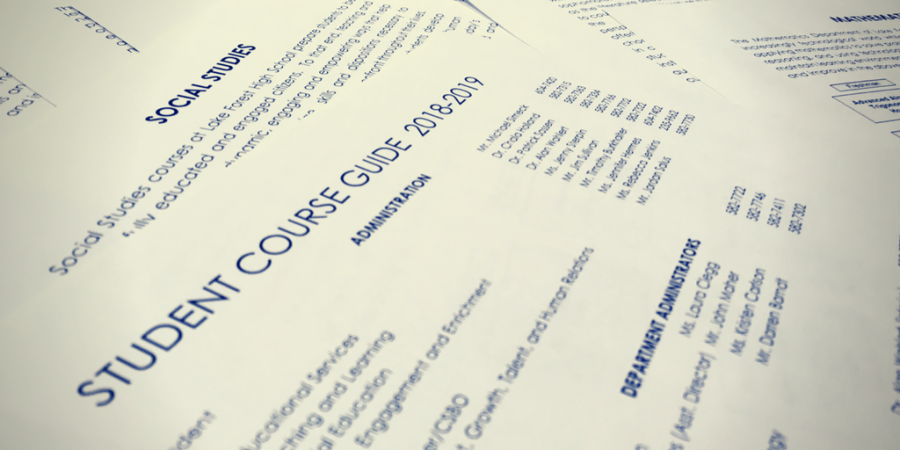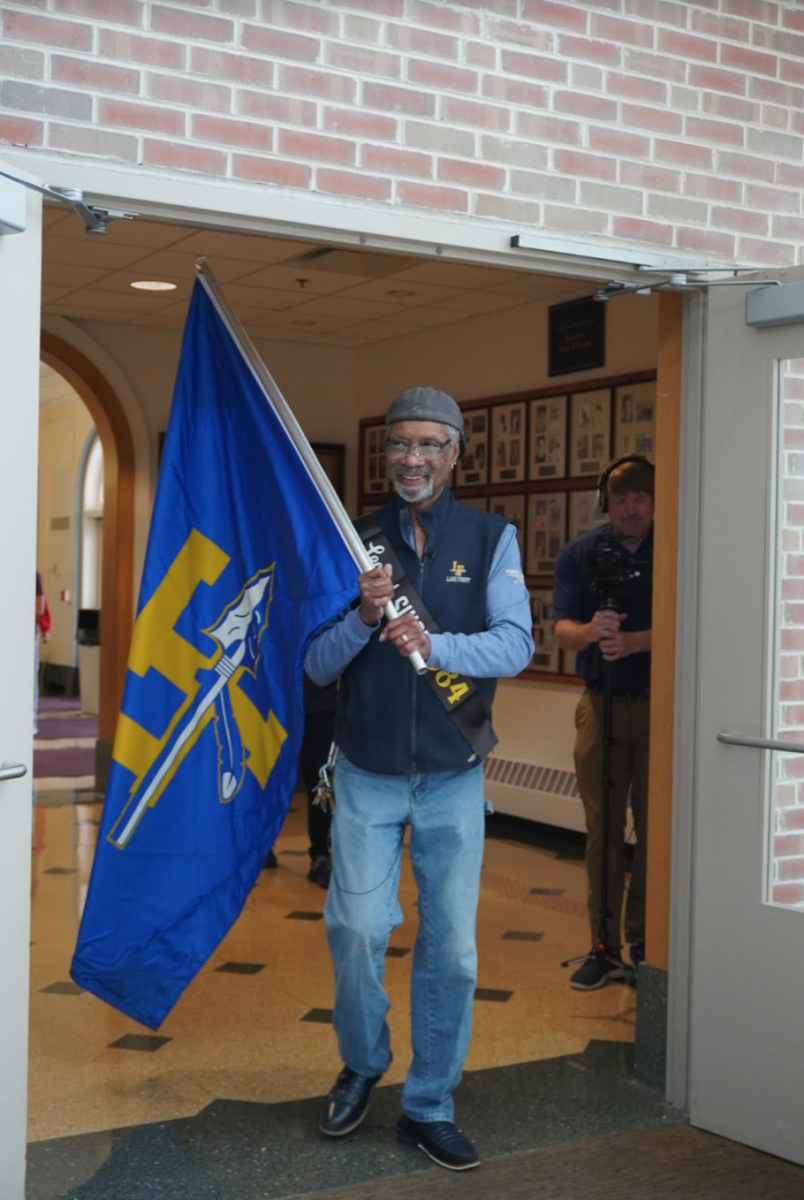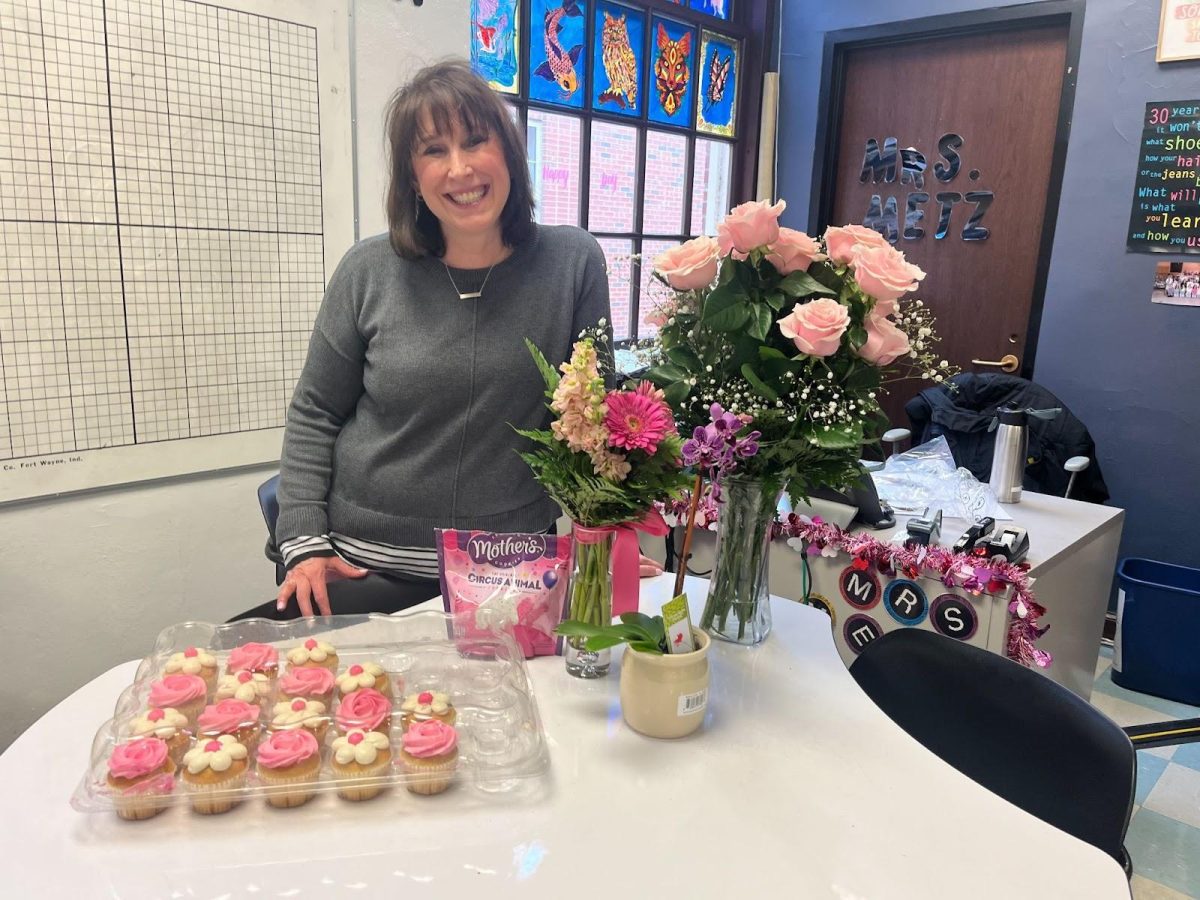At 7 a.m., the alarm goes off. By 7:15, breakfast is being prepared and eaten. By 7:45, the car is on its way to a building of 1,500 students. By 8:15, a class starts, with students pining for a goal created by a letter of the alphabet, a fictional reason to work and exert full attention, often to the point of exhaustion. By 4:00 p.m., the uniform is on or the rehearsal has started, again for the goal of a word on an application, a check in the box or a bullet point on a list. At 8:00, homework, another step on the goal to reach that fictitious letter, begins and is toiled over for seemingly no other reason than a fabricated and desired grade.
This is a cycle. Everyone’s cycle looks a little different. Some are inundated with advanced level classes, others not. Some grades are harder to get, and some subjects are harder to succeed in. Some classes people hate, and others love them.
Why do we live like this? What is the real reason that we, high school students, are working ourselves to the point of exhaustion and overachieving stress levels? Why are we stuck in this seemingly eternal rut of the modern education system that focuses so hard on total success and unrealistic expectations?
Depending on where high school students on the North Shore go to school, advanced classes look different. While our high school has distinct honors and CP (College Preparatory) classes, other schools, like New Trier High School in Northfield/Winnetka, offer classes in levels. The leveling system offers three options for students: levels two, three and four. The majority of students at New Trier take level three classes, which are considered advanced. These tracks are available for every subject area.
Warren Township High School in Gurnee, along with Deerfield High School in Deerfield offer classes more similarly to ours. However, the names of these classes differ greatly from ours. Warren offers “fail/safe” and “intense” level classes, while Deerfield offers “survey,” “regular,” and more similar to us, honors and AP.
When choosing classes, there is a consensus among schools in the area that students most often choose their classes based off of interest and ability. “At around the end of first semester teachers give out class recommendations for the next year based on how well the student is doing in class,” explained Deerfield senior Uri Uziel. “These recommendations are the options for what a student can take next year. For instance, if my English teacher recommends me for regular level English, the only way for me to take an AP English class would be to go through the override process. This just means that I’d have to get the teacher to sign a piece of paper saying that it’s okay for me to take a class outside of the ones they recommended.”
While teachers at Lake Forest High School may have recommendations for students, it is ultimately the decision of the student to make as to which class to take. This can be both positive and negative; if a student excels in many different areas academically, taking all advanced courses is not ideal for balance in the student’s schedule, despite the individual teacher’s recommending that the student do just that. However, if the student believes they should take a higher level course, there is no process to allow them to do that, only the guidance of their counselor. This could put the student in a difficult situation where the balance is off in their schedule, and they are not able to perform at their greatest potential.
Class selections are, however, influenced by outside forces that many students may not realize. There are pressures from home and from friends, “which of course, is a reality,” according to senior Mack Guthrie of New Trier.
While senior Jack Berens of Warren believes balance is a popular reason for class selection, he also believes decisions are made with “40% personal interest, 40% academic interest, 20% social pressure.”
Deerfield’s Uziel believes that college pressures play a role in selections as well. “It’s drilled into us since freshman year that colleges look at class rigor as one of their admission factors and that’s always looming over you if you’re trying to get into a particular school, even if you know that the class might be harder than what you’re ready for.” More positively, Uziel noted that the communities of the advanced courses he has taken have encouraged him to continue taking those classes because, according to him, “you tend to see a lot of the same people and become good friends with them, and that definitely impacts class selection.”
In my personal observation, I have noticed that people will hear that a class is “boring” or “easy” or “impossible” and that unknowingly will have an effect on the student’s class selection.
Socially, do the classes that you take provide you with an unwanted label that may or may not be true? New Trier believes that there are stereotypes for students in advanced levels for sure (“stressed out nerds”), but that there also is a vast spectrum of students who take advanced classes.
Warren does not observe an outright stereotype towards students taking advanced classes, but generally believes that students in advanced classes are seen as smarter.
Deerfield also does not observe a “blatant” stereotype against advanced students, but Uziel speculated that “I’m sure it exists and I know that there’s a decent amount of social parity between kids that take advanced classes and kids that take regular level classes.”
Personally, I have observed that students in advanced classes are seen as “smart” and those who don’t “not smart.” This standard applied to students taking advanced level courses is not accurate and not fair to students who take classes according to their abilities. But nevertheless, these labels do exist to an extent that may unconsciously influence self esteem and the measuring of our individual abilities.
Another essential factor to curriculum in area high schools is flexibility. How bound are students to the honors track or the AP route? For New Trier, making the jump from level to level (only one level jumps, never two) requires either a teacher recommendation paired with a parent signature, or without teacher recommendation with the student taking full responsibility for the change.
Berens explained that while students are expected to continue in advanced classes if they perform well, it is also not difficult to maneuver up or down to a different level.
Deerfield’s Uziel explained that once a student gets on a track, usually there isn’t a reason to move, unless they feel a strong need to. “A lot of the time the dominoes fall that way where a kid who’s been in advanced level math since middle school continues that throughout high school but I don’t think there’s an intense expectation that they do. I think more so the student gets comfortable with being on a specific track and deviating it from it seems weird and unnecessary to them.”
While dropping is a fairly easy thing for students to do at LFHS, jumping up to a different level usually requires extra work, sometimes an extra class over the summer.
In terms of APs themselves, the offerings at different schools vary. New Trier offers almost every AP class, but they only open AP classes to juniors and seniors. “This serves the dual purposes of keeping average pass rates high, and the ethical/philosophical idea that freshman and sophomores should be focused on high school, not always stressed about taking college level courses,” Guthrie explained. Warren’s AP offerings were described as “all the bases covered.” While Deerfield does not offer some more unconventional language AP courses, they offer about 15-20 different courses in humanities and STEM areas, according to Uziel. LFHS opens AP classes to sophomores, juniors, and seniors, but mostly upperclassmen take AP classes. Our course offerings are wide ranging, from Physics C to Music Theory. LFHS also requires chemistry to be taken before any student takes an AP Science class.
When it comes time for college, rigor is something that students take seriously, and colleges usually follow suit. “Of course course levels affect college admissions, it should be neither a surprise nor controversial that top colleges expect students to be taking top level classes, in this case level 3,” Guthrie of New Trier told me. He went on to explain how even level three classes are accepted as advanced classes in the eyes of colleges, much like the accelerated math classes at LFHS are considered more rigorous than CP.
Berens found that his advanced classes were worth more in the eyes of college admissions. “There’s a big difference between someone who gets an A in Algebra 1 and someone who gets an A in Linear Algebra in high school,” he explained. “Schools look for high achievers who are well-rounded in my eyes.”
According to Uziel, the decision to take advanced classes was indeed influenced by college ambition. “I figured that amount of honors would impact my chances of admission pretty significantly, mainly because I applied to schools that accept weighted GPA and unweighted GPA,” he told me.
At LFHS, there is most definitely an incentive to take advanced classes to boost college admissions opportunities. I personally know students who take four to five AP courses in one year to be able to get out of classes in college–even though they do not know how the school they are going to (or hope to go to) will react to their scores on these exams. I also know of students who take copious amounts of honors courses in order to boost their GPA, as Uri explained.
So what should colleges consider? According to Berens, grades, courses, extracurriculars, essays, personality, volunteering, sex, interest, socioeconomic status and a myriad of other seemingly irrelevant factors are the most important. Uziel took this a step further, explaining how “colleges should focus more on rigor of schedule, extracurriculars, and recommendation letters than straight GPA.” By seeing students for who they are as opposed to who they are on a piece of paper or a computer screen, schools have the chance to see the people behind the numbers.
Universally, it is agreed upon that there are two main factors that students should take into account when choosing their classes. By taking into account interest level in the subject and the academic ability, students will be able to have enjoyable success in their schedules.
In addition to these factors, Jack explained that “lifestyle, natural ability in the subject, the pace/intensity of the course, the difficulty of other courses, and the transition from their current course to the prospective one” are all important to consider as well.
“Take the classes that you like and/or that you think you can do well in,” Uri advised. He also offered some speculations about the reality of today’s students. “Obviously there’s the part about looking good for colleges but I think most the time students take a class either because they have a deep interest in the topic, it’s a high level class that they know they’ll do well in and it’ll look good on their transcript, or they know they can kind of blow it off and get a good grade.”
Personally, I believe that students should explore and find their interests and strengths (two very different things) and take classes according to those factors. The difference between interest and strength lies in ability: if someone is interested in science, but may not excel at it, they should take a class that might be at their performance level. If someone has a strength in a subject, then taking an honors or advanced class is a smart option. Ultimately, it should be the student’s decision on what classes to take, not anyone else’s.
What it all comes down to is the expectation. It comes down to the fictional letter or the arbitrary number in the gradebook. Students in 2018 have pressures that they may not realize. Some of these pressures involve their peers or their families, but a lot of the pressure is internal, and it is caused by the looming and unassuming presence of college itself. For the most part, Uri agrees that “kids who decide to take honors classes early are doing it out of expectation.” While it is not obvious, the expectation to get the A or score the goal, or even write the best essay or get the most service hours, school has become a competition. If life at school slowed down and students began to disregard outside opinions, how would our classes be different? Maybe kids would look forward to school instead of fearing it because of testing or due dates. But as long as the pressures are there, the numbers and letters dangling in front of our faces, who knows?
Senior Mack Guthrie of New Trier News, senior Jack Berens of Warren, and senior Uri Uziel of Deerfield News all contributed to this article. Highland Park High School and Glenbrook North High School could not be reached for comment.


















